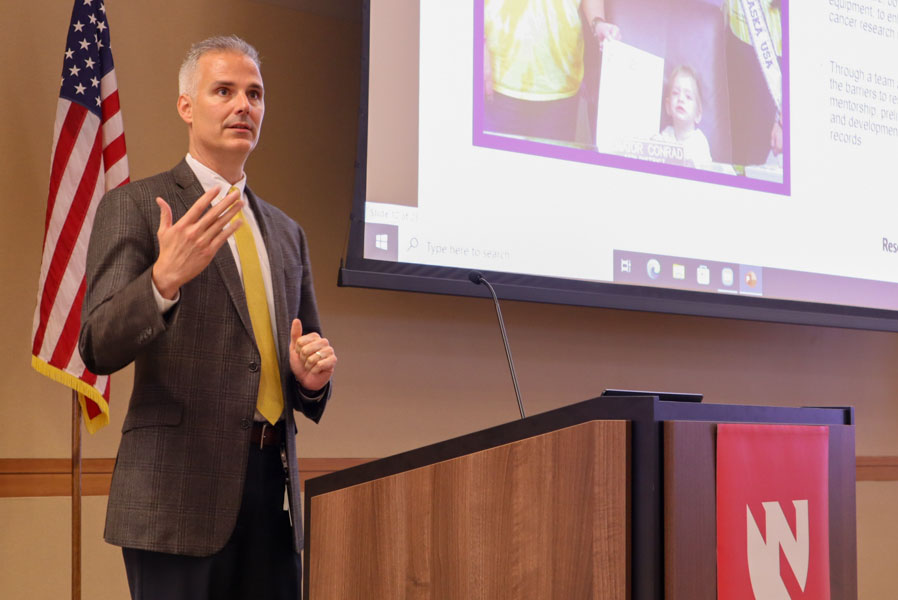The Child Health Research Institute held its fifth annual Pediatric Cancer Research Symposium on Aug. 31. The event offered important updates from the Pediatric Cancer Research Group and presentations from researchers representing the wide range of pediatric cancer science.
Nearly 100 people registered for the event — showing how the symposium has grown over its five years.
Don Coulter, MD, professor in the UNMC Division of Pediatric Hematology/Oncology and director of the Pediatric Cancer Research Group, discussed his recollections of the research group’s formation and the symposium.
Before being incorporated into the Child Health Research Institute in 2018, the research group was started in 2014 due to the collective efforts of families affected by pediatric cancer, philanthropic groups, state legislative representatives and key cancer physicians and scientists. They all believed that Nebraska, which continually ranks in the top 10 among U.S. states for diagnoses of pediatric cancer and childhood brain tumors, should be doing more to fund pediatric cancer research.
Among the cancer researchers lobbying for a greater commitment were Ken Cowan, MD, PhD, director and physician-in-chief of the Fred & Pamela Buffett Cancer Center, John Sparks, MD, retired professor of pediatrics and original Child Health Research Institute executive director, and Dr. Coulter.
As a result of these efforts, the Nebraska Legislature passed a bill providing $1.8 million — a number symbolically chosen to match the number of residents in the state — to establish an infrastructure to empower research into pediatric cancer.
Dr. Coulter said the early planners realized they would need a method to showcase to stakeholders how they were using the funding, which later would be included annually into the state budget.
“One of the truly unique aspects of the PCRG is that from the outset, we were beholden not only to the state government that was funding us but also to the patient families and philanthropic groups that were key to our formation as an entity,” he said.
The Pediatric Cancer Research Symposium premiered in 2018 as an event where all interested parties could learn, connect and collaborate.
“We realized early on that our event had a wide-audience with varied interests and priorities,” Dr. Coulter said. “It was important to provide agenda elements that could be understood and appreciated by non-scientists. Yet the researchers in our audience also were eager to share and learn from one another through presentations that might be difficult for a layperson to follow.”
As a result, throughout its five-year history, the symposium has included a variety of themes and formats. The 2019 symposium emphasized giving voice to the concerns and questions of the non-scientific community.
“I feel like we do a really good job of using the symposium to keep us accountable to our stakeholders,” Dr. Coulter said. “My wish list for future symposiums would be to add more time where our audiences can talk to one another.
“This is great for our researchers who use stories from patient families to fuel them through the long, tedious, trying aspects of research.”
Dr. Coulter said he could never have imagined the growth of the symposium over five years.
“I can’t help but be gratified by our having over 50 members now and having successfully funded so much research, some of which is impacting the lives of pediatric cancer patients already,” he said.
